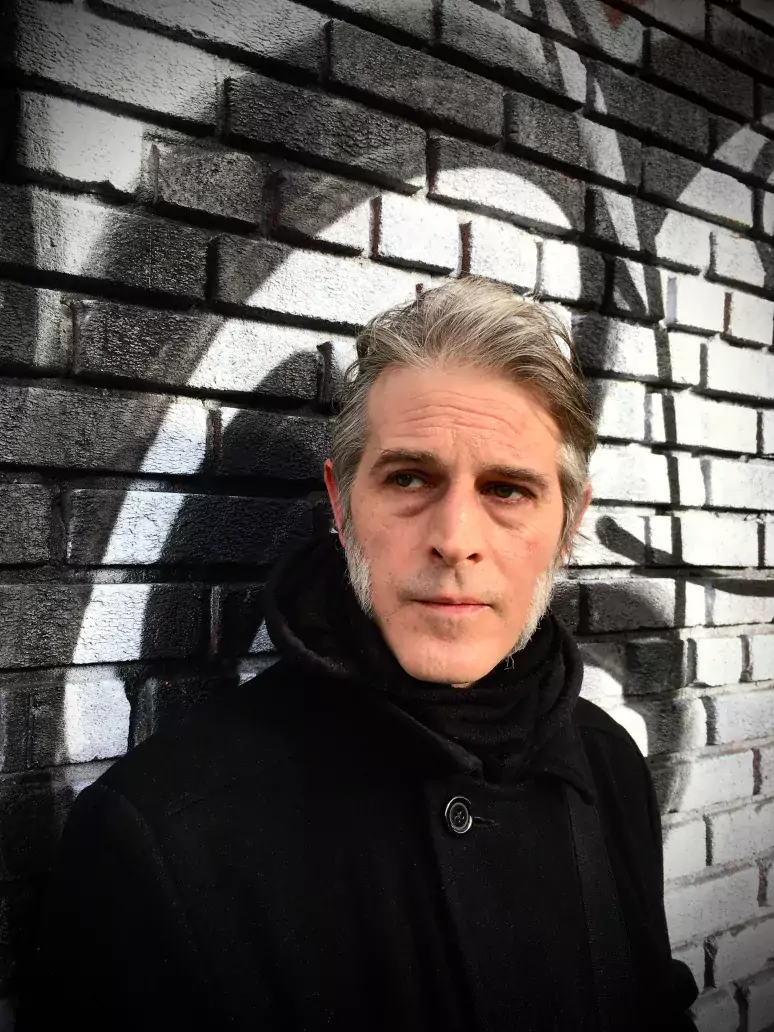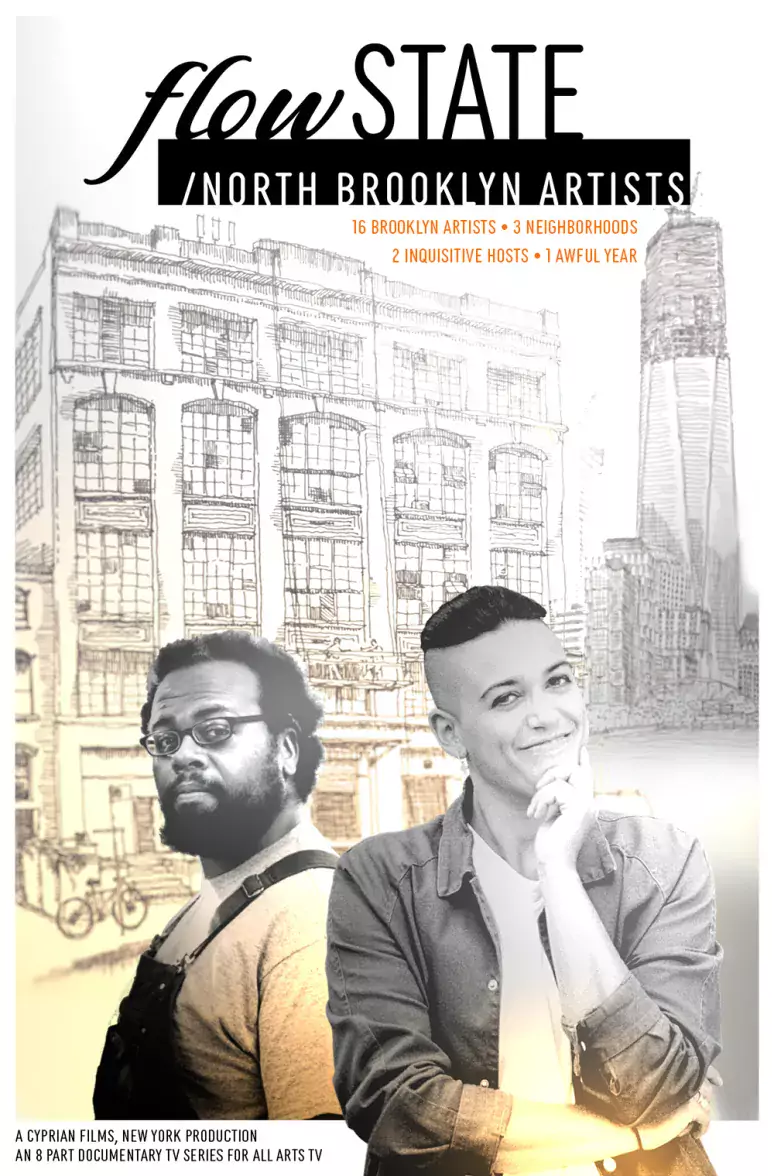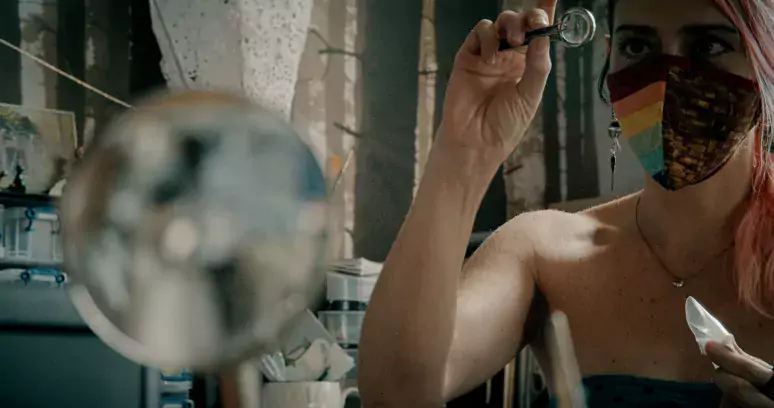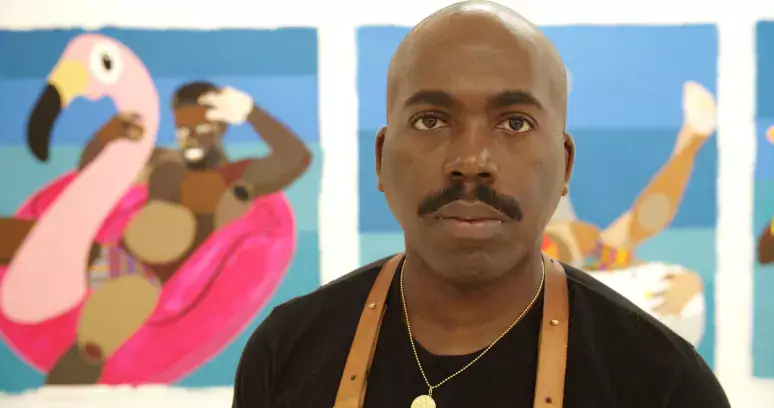
CCAD grad discusses documentary about Brooklyn artists

Columbus College of Art & Design graduate Joshua Starcher (Fine Arts, 2001) was part of a documentary team set to start filming its subjects—working artists in New York City—when the COVID-19 pandemic hit. It was early 2020 and everything shut down. “In New York City, the pandemic got real intense, real quick,” he recalls. “We were still determined to see the show through, though.”
A few months passed. The city began to reopen, with caution, and the documentary series Starcher was working on, Flowstate / North Brooklyn Artists, began production in earnest, albeit with extra challenges in response to the circumstances. Everyone on set was regularly tested for COVID-19. They had a medic on staff, regularly sanitized the equipment, and used plenty of PPE (personal protective equipment). It was, says Starcher, “a hectic and confusing time,” but Flowstate’s production company, Cyprian Films, New York, stayed steady.
Flowstate is a documentary TV series that profiles 16 artists over the course of eight episodes to find out what it's like to be an artist in North Brooklyn. “The most impressive thing to me was, no matter how hard things got, all of the artists we spoke to continued making their art. That was one of the most inspiring things. It was really heartwarming to see artists doing what they do—persevere,” Starcher says.

Starcher himself is an artist working in Brooklyn. Born in Cuyahoga Falls, Ohio and raised between Northeast Ohio and Charlotte, North Carolina, he moved with his wife to Queens in 2002 before relocating to their Greenpoint, Brooklyn residence in 2006.
In his role as Associate Producer & Researcher for Flowstate, Starcher helped recommend artists to feature, scouted locations, and gave notes on episodes as they came in as part of a “very collaborative” working process with Minos Papas, the series’ director.
Starcher credits his work ethic to his days as a student at CCAD. CCAD was a place where he pursued his primary passion, painting, as well as found the opportunity to explore other materials and creative practices—including, notably, film editing.
“I can honestly say that I refer to my CCAD education more than any other professional experience,” says Starcher.
Below, he shares more about Flowstate, CCAD’s impact on his creative path, and his advice for CCAD students.
How did your CCAD education impact the work you do today?
At CCAD, I was able to focus all of my energy on art for the first time in my life and I took full advantage of the opportunity. I established a strong around-the-clock work ethic which I still maintain today.
From a painter’s point of view, I learned that the first pass is never enough. I gained the agency to paint things out. I learned how to build up a drawing, a painting, an idea, and deconstruct it and rearrange it for better results. There are lessons on 2D design, composition, and art history that have never left me. I learned how to stretch a canvas and hang a show at CCAD. I still find myself referring to color in terms of the Munsell Color Chart.
I also got to experience materials and mediums that were completely new to me like printmaking, Photoshop, and media studies, where I was editing video—lessons that I had no idea I might need later on in the future, that I still hold in my back pocket today. I can honestly say that I refer to my CCAD education more than any other professional experience.
What advice would you give to a CCAD student who aspires to be where you are today?
Keep working. Keep searching. Keep learning. Keep pushing. Keep seeing art. Keep making art. Just keep looking for the next opportunity. Show up for yourself and others. Support each other.
And I would also recommend watching Flowstate. There are so many great moments where working artists share knowledge and inspiration. Everything from Buket Savci’s mantra, “Your Art Will Save You, Your Art Will Save You” to Lisa Corinne Davis’ wise words to “not have some preset plan that this has to happen, in this way, at this time.”
The 16 artists you followed come from different backgrounds and are at different stages in their careers. Did you find shared attributes or experiences among them? Were there particular stories that stuck with you?
I think the diversity of the show is one of its strengths, for sure. The fact that we talk to artists from so many different backgrounds and stages of their careers actually ends up amplifying the traits that they do have in common—they are committed to their work, maintain a daily practice, have a strong work ethic, and genuinely enjoy connecting with others.
A couple of stories that resonated with me included those of …
Fara’h Salehi, who, growing up, wanted to be a mechanic like her father, but decided to pursue art. After graduating from Pratt, Salehi landed a welding job at a fabrication shop. It immediately reminded her of the sights and smells of her father’s shop and she knew she had found her calling. Through hard work and determination, Salehi now runs her own fabrication shop and art studio.
Amber Hany became consumed with the idea of how much waste people discard on a daily basis and its environmental impact. So, she started collecting items that would otherwise be discarded, and, applying her experience as a scenic artist, repurposed the objects into miniature sets of the world around her, turning what might otherwise be waste into something new and beautiful.

Derrick Adams felt that popular culture tended to depict African Americans in limited ways, so he set out to create the images that he wanted to see. When thinking about this, Adams came to realize the power in depicting Black joy and considers this imagery just as radical and important for the youth as images of people standing up to injustice.

Did this project prompt you to reassess what it’s like to be an artist working in New York City right now?
In Flowstate, we get to see artists as the dedicated, hard-working, and earnest people that we know them to be. We also get to see artists as complete people—sincere, humorous, and thoughtful. The way that different artists describe their relationship with their neighborhood is also very intimate and inspiring. I’m very proud to be a part of this project because of how accurately it portrays what it’s like to be an artist.
What’s next for you?
I’ve been working on a series of figurative drawings over the course of the last year that I plan on developing into a series of paintings. This is part of a larger body of work that I started at CCAD 20 years ago.
Flowstate / North Brooklyn Artists airs at 8 p.m. Wednesdays through April 14 on ALL ARTS TV, which is available on the following: Optimum 144 // Verizon Fios SD 497/HD 498 // Comcast 958/1156 // Spectrum 1276 // Digital.Antenna 21.4. The series also streams on AppleTV, Roku, Amazon Fire, and the ALL ARTS TV app. Visit allarts.org/flowstate for more information.
Learn more about Joshua Starcher on his website or on Instagram.
Learn more about the Fine Arts program at CCAD or apply here.
Photos, from top:
Joshua Starcher
Flowstate movie poster
Amber Haney in Flowstate
Derrick Adams in Flowstate
Post date
March 23, 2021